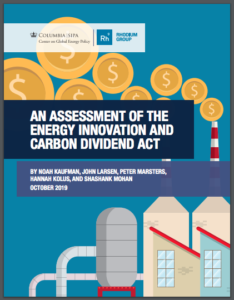Full Title: An Assessment of the Energy Innovation and Carbon Dividend Act
Author(s): NOAH KAUFMAN, JOHN LARSEN, PETER MARSTERS, HANNAH KOLUS AND SHASHANK MOHAN
Publisher(s): Columbia University Center on Global Energy Policy
Publication Date: November 6, 2019
Full Text: Download Resource
Description (excerpt):
Growing public concern about the social, economic, and environmental impacts of climate change, along with pressure for lawmakers to introduce policy proposals that reduce emissions, have brought carbon taxes to the center of policy discussions on Capitol Hill. Thus far in 2019, seven different carbon tax legislative proposals have been introduced in Congress. The proposal with the most cosponsors, totaling 64 Democrats and 1 Republican as of the end of September 2019, is the Energy Innovation and Carbon Dividend Act (EICDA), introduced in February 2019 by lead sponsor Ted Deutch (D-FL). This study assesses the potential impacts of EICDA on the US energy system, environment, and economy.
EICDA establishes a fee on each ton of greenhouse gas (GHG) emissions. It covers over 80 percent of gross national emissions. The fee starts at $15 per metric ton and increases by $10 or $15 each year, depending on future emissions levels. Revenue raised by the carbon fee is used for “carbon dividends,” a rebate to every eligible US citizen or lawful resident. The bill also includes measures to protect US competitiveness and to reduce the risk that companies will relocate their operations to a different country with laxer climate laws. Through the carbon fee and additional regulations if necessary, EICDA targets 90 percent emissions reductions by 2050 compared to 2016 levels.
This study is part of a joint effort by Columbia University’s Center on Global Energy Policy (CGEP) and Rhodium Group to help policymakers, journalists, and other stakeholders understand the important decisions associated with the design of carbon tax policies and the implications of these decisions. This analysis uses a version of the National Energy Modeling System maintained by the Rhodium Group (RHG-NEMS) to quantify the energy and environmental implications of EICDA, focusing on outcomes through 2030. Supplemental analyses provide insights on how EICDA would affect households, the economy, and government budgets.
